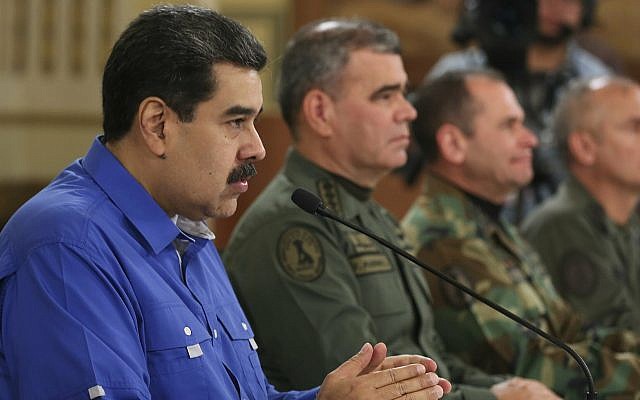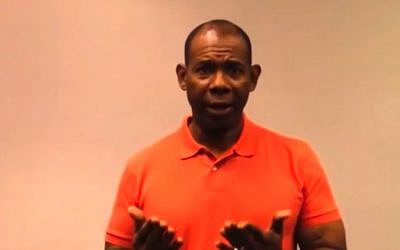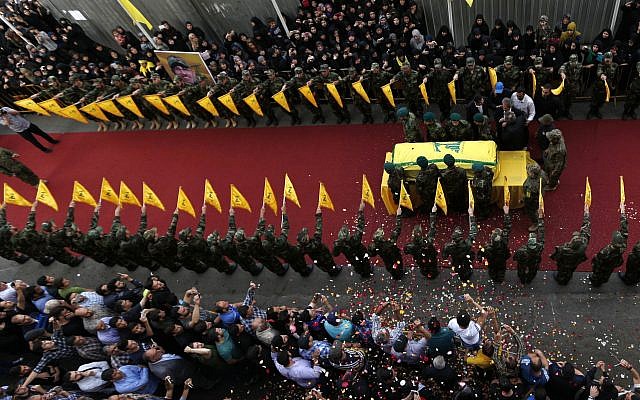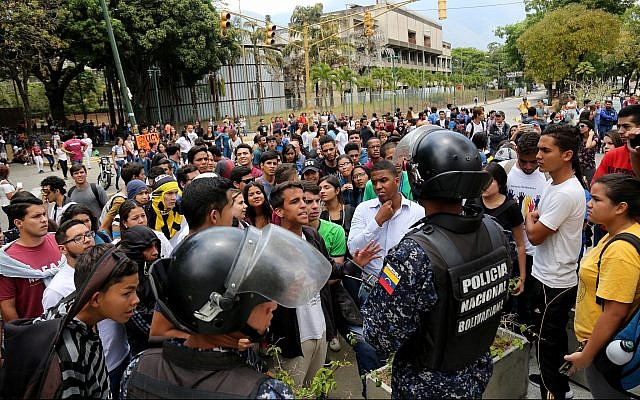
Former chief of regime’s notorious SEBIN security police accuses president of heading ‘criminal enterprise’
By TOI STAFF Today, 1:05 pm
The feared former head of Venezuelan strongman Nicolas Maduro’s intelligence police has charged that the Lebanese terror group Hezbollah operates in the Latin American country with the protection of the government.
Gen. Manuel Ricardo Cristopher Figuera, who fled his homeland for Colombia and then the US after the failed April 30 uprising in the country, has been passing some of the Maduro regime’s most closely held secrets to American officials.
In an interview with the Washington Post published Monday, he spoke of his disenchantment with the government he had once worked to protect.
“I never saw the country’s situation and the government’s corruption as closely as I did during my last six months,” he said, the period when he ran the notorious SEBIN, or Bolivarian Intelligence Service, the regime’s political security arm.
“I quickly realized that Maduro is the head of a criminal enterprise, with his own family involved,” Figuera said.

Among the abuses: family members linked to the regime using their influence to buy and sell gold to the state for huge profits; support for terror groups like the Colombian ELN; and the deep influence that Cuba’s Raoul Castro has over Maduro, both personally and through Cuban guards and advisers who surround the Venezuelan president.
And, Figuera added, he had seen intelligence reports that say the Lebanese terror group Hezbollah was operating in the capital Caracas, in nearby Maracay, and in the offshore island region of Nueva Esparta with the blessing of the Maduro government. The presence is “apparently geared toward illicit business activity to help fund operations in the Middle East,” the Post reported.
Hezbollah has long been believed by Western intelligence agencies to be playing a significant role in the South American drug trade in order to help finance its military buildup in Lebanon and its infrastructure around the world, but Figuera’s comments, cited only in brief in the Post interview, may be the highest-level admission about such activities from a former top official of a regime that supports the group.
A report earlier this month by Israeli researchers said Hezbollah personnel act as middlemen in the global drug route from South America to West Africa and from there to Europe, helping to move hundreds of tons of cocaine and other drugs through ports in Belgium and Germany — with only 5-10 percent of it being intercepted by law enforcement.
Also in June, the US and Argentina convened a two-day regional summit in Buenos Aires about the persistent Hezbollah threat in the Western Hemisphere. The summit held on June 11 and 12 came a month ahead of the 25th anniversary of the terrorist bombing of the AMIA Jewish center in the Argentine capital. The attack was carried out by a Hezbollah suicide bomber and orchestrated by Iran, the late Argentinian investigator Alberto Nisman established.

Law enforcement, prosecutors and financial practitioners attended the workshop, a State Department release said. They came from the two convening countries as well as Chile, Colombia, Panama, Paraguay and Peru.
“The workshop focused on Hezbollah’s modus operandi globally and its terrorist and criminal infrastructure and activities in the Americas,” the release said. “Participants discussed various techniques to constrain and counter the group’s illicit activities, including the financial and law enforcement tools available to identify, investigate, and prosecute Hezbollah’s global support and facilitation networks.”
The summit was timed as part of the events that Argentina’s government is planning to mark the anniversary of the blast on July 18, 1994, which killed 85 and injured more than 300.
The Mossad intelligence agency played a cat-and-mouse game with the Hezbollah terror group to stymie its efforts to establish explosives storehouses from Thailand to New York, an Israeli intelligence official confirmed earlier this month.
The largest cache, containing some three tons of ammonium nitrate, a key ingredient for some types of explosives, was found at four locations in north London, sites raided by the Metropolitan Police in September 2015. Other caches planted by Hezbollah cells were discovered in Cyprus, Thailand and as-yet unnamed European countries, according to reports.
Figuera, meanwhile, was one of a handful of Venezuelan officials placed under US sanctions for his role as head of a security service notorious for torture and the inhumane treatment meted out to political prisoners.

A former head of security for Maduro’s mentor, former president Hugo Chavez, Figuera was thought to be one of the regime’s true believers.
But his role in its excesses has led to profound regret, he said.
SEBIN’s “Tomb,” the prison for political prisoners under its Caracas headquarters, has long been accused of inhumane conditions that led to prisoner deaths and suicides — conditions meant to coerce confessions for political crimes.
“Look, if there’s something I regret it’s that I didn’t free all the prisoners. Because there’s a lot of people there who are kidnapped and who are there unfairly. And I owe those people, you know?”
He added: “At one point I thought I was going to be able to bring Maduro to his senses. There are people there who have cancer. There’s a woman there with special issues. There are people who have nothing to do and no reason to be there. I believe I could have done more. Those people are not a threat to the country.”